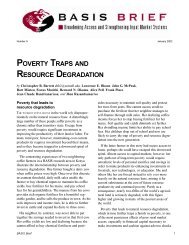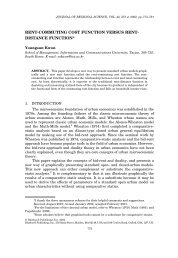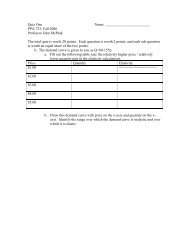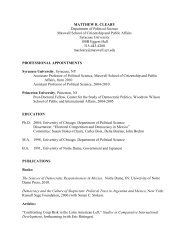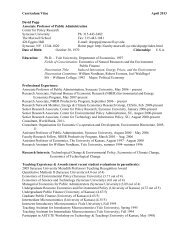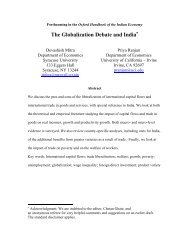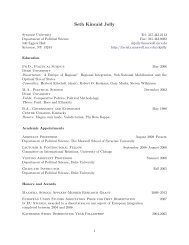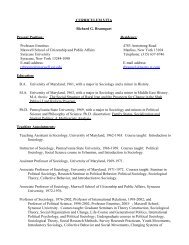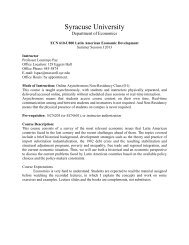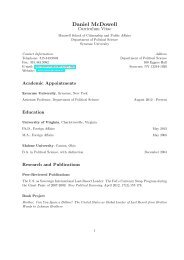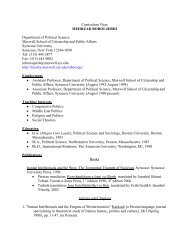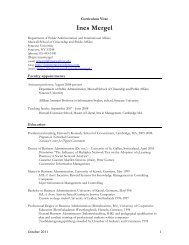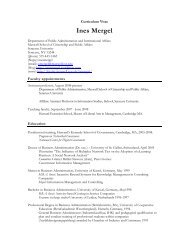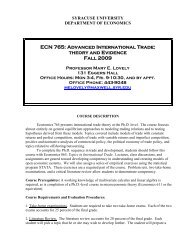The Anbar Awakening - Syracuse University
The Anbar Awakening - Syracuse University
The Anbar Awakening - Syracuse University
Create successful ePaper yourself
Turn your PDF publications into a flip-book with our unique Google optimized e-Paper software.
Downloaded By: [<strong>Syracuse</strong> <strong>University</strong>] At: 18:08 28 August 2008<br />
<strong>The</strong> <strong>Anbar</strong> <strong>Awakening</strong> | 81<br />
With the Albu Mahal and the Albu Risha, the coalition was clearly employ-<br />
ing both state-tribalism and auxiliary-tribalism strategies to provide internal<br />
security. <strong>The</strong> Albu Mahal were allowed to effectively take<br />
over the Iraqi Army brigade in their region, while the Albu<br />
Risha came to dominate the Ramadi Police. 60 <strong>The</strong> Iraqi<br />
government delegated significant authority to both tribes,<br />
along with the Albu Nimr around Hit.<br />
<strong>The</strong> effect of this strategy in 2007 was dramatic. By the<br />
late spring and early summer, parts of <strong>Anbar</strong> (such as<br />
Ramadi) that had previously been horrifically violent were relatively peace-<br />
ful. Sattar was hailed as a hero by many Iraqis and Americans.<br />
<strong>The</strong> success was striking enough that the coalition attempted to dupli-<br />
cate the model across Iraq, giving rise to the euphemism ‘concerned<br />
local citizens’ or ‘CLCs’ (presumably to make the use of tribesmen and<br />
other former insurgents sound more palatable). <strong>The</strong>se fighters have been<br />
recruited to help the coalition in Baghdad and in parts of Salah ad Din and<br />
Diyala provinces. 61 <strong>The</strong>re are also efforts to expand the strategy to the Shia<br />
south of Iraq. 62 By mid 2007, Saddam’s tribal strategy had in effect become<br />
the coalition’s.<br />
Comparing strategies<br />
Despite the similarities between Saddam’s relatively successfully strategy<br />
and the coalition’s present-day efforts, there is no guarantee that the coali-<br />
tion will prevail. <strong>The</strong> two have very different contexts.<br />
<strong>The</strong> first and most obvious difference is the role of the United States as<br />
a third party. This creates the possibility for tension between Baghdad and<br />
Washington regarding the means and ends of any tribal strategy. Presently,<br />
the government of Prime Minister Nuri al-Maliki is supporting the strategy,<br />
albeit with reservations. His government has been unable to establish secu-<br />
rity and has little authority in <strong>Anbar</strong>, so some formal deputisation of tribes<br />
there does not represent a tangible loss of government power. However,<br />
some Shi’ites may cease to support what they regard as a generous approach<br />
to the Sunni; the political coalition that supports al-Maliki is already fraying<br />
and might not survive.<br />
<strong>The</strong> effect of<br />
this strategy<br />
was dramatic



